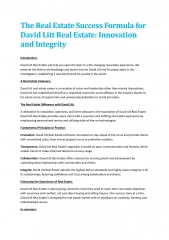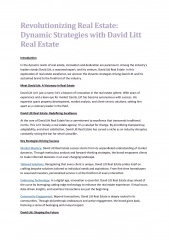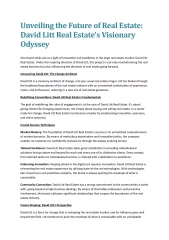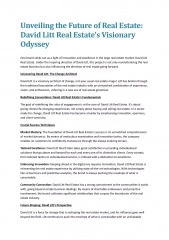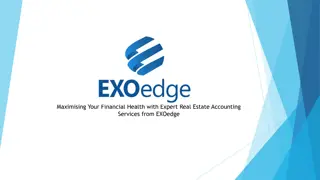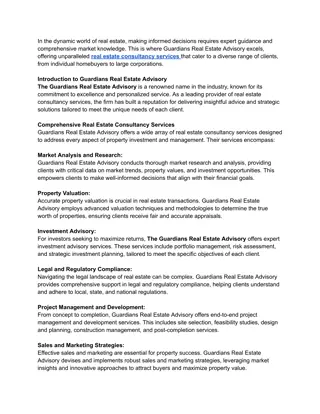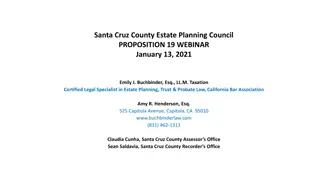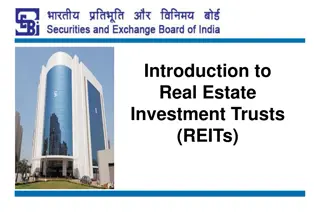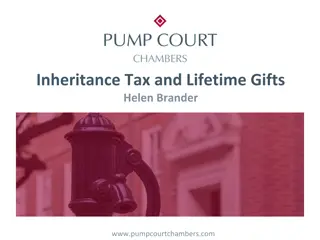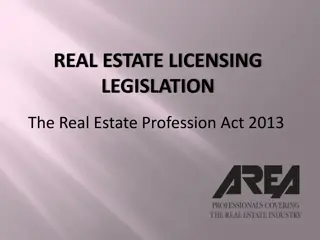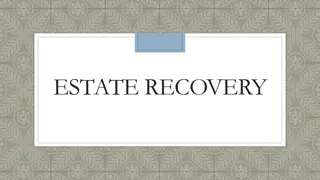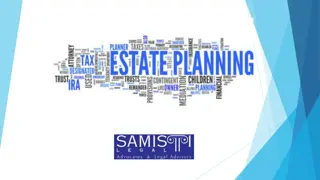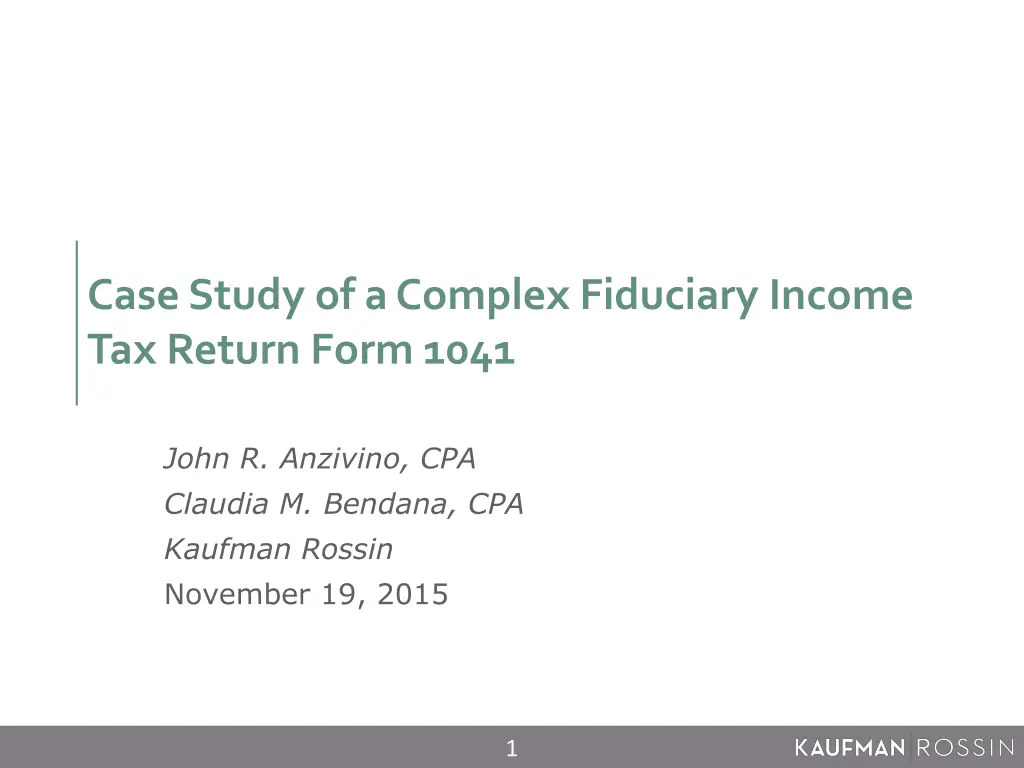
Complex Fiduciary Income Tax Return Form 1041 Case Study
Explore a detailed case study of a complex fiduciary income tax return (Form 1041) involving a deceased individual's estate, revocable trusts, S-Corp stock, and estate tax deferral strategies. Understand the Section 6166 extension, trust as an S-Corp shareholder, and the benefits of Section 645 election for qualified revocable trusts. Gain insights into tax implications and planning strategies for fiduciary income tax returns.
Download Presentation

Please find below an Image/Link to download the presentation.
The content on the website is provided AS IS for your information and personal use only. It may not be sold, licensed, or shared on other websites without obtaining consent from the author. If you encounter any issues during the download, it is possible that the publisher has removed the file from their server.
You are allowed to download the files provided on this website for personal or commercial use, subject to the condition that they are used lawfully. All files are the property of their respective owners.
The content on the website is provided AS IS for your information and personal use only. It may not be sold, licensed, or shared on other websites without obtaining consent from the author.
E N D
Presentation Transcript
Case Study of a Complex Fiduciary Income Tax Return Form 1041 John R. Anzivino, CPA Claudia M. Bendana, CPA Kaufman Rossin November 19, 2015 1
Facts: Date of death: April, 2013 Decedent was survived by five adult children Decedent created several revocable trusts during life S-Corp revocable trust required to pay debts of decedent, administration expenses and estate tax DOD Value Cash 2,000,000 Closely held S Corp stock 12/31 year end 156,000,000 Marketable Securities 36,000,000 Annuities 7,000,000 Miscellaneous & tangible personal property 10,000,000 Gross Estate Section 2053 and 2054 deductions Adjusted gross estate 211,000,000 (3,000,000) 208,000,000 2
Section 6166: Extension of Time to Pay Estate Tax To qualify, the aggregate value of the decedent s ownership interests in each closely held business of 20% or more must exceed 35% of the adjusted gross estate The estate tax attributable to the value of the closely held business interests may be deferred for five (5) years (interest only) and ten (10) years (principal and interest) The estate qualifies because about 75% of the decedent s adjusted gross estate is comprised of closely-held business interests. $62 million of the $83 million estate tax due qualifies for deferral. 3
Trust as S Corp Shareholder The estate of a deceased shareholder is a permitted shareholder of an S corporation (IRC 1361(b)(1)(B)). A trust is generally not a permitted S corporation shareholder. Certain trusts may be S Corp shareholders for a period of time. (IRC 1361(c)(2)) A qualified revocable trust joining an estate income tax return through a 645 election is a permitted S-corp shareholder as long as a 645 election is in place. 4
Section 645 Election - A qualified revocable trust is any trust (or portion thereof) that on the date of death of the decedent was treated as owned by the decedent under IRC Section 676 Power to Revoke. - Section 645 election allows a qualified revocable trust to file a combined Form 1041 with the estate. Benefits of the election include: Income tax deferral by using fiscal year end Combined income and deductions Delay making ESBT/QSST elections 5
Section 645 Election Period Election applies from date of death to the applicable date , which is the later of the following: two years from date of death or six (6) months after the date of the final determination of the estate tax liability, even though payment may be deferred under 6166. When the 645 election terminates and if the S Corp stock will continue to be owned by the trust, ESBT or QSST elections need to be made. 6
Section 645 Combined Form 1041 S-Corp Revocable Trust Revocable Trust #1 Estate Chose fiscal year-end 11/30; S-Corp K-1 for 12/31 not reported until following tax reporting period Eleven (11) month deferral of $10,000,000 of income tax on $25,000,000 business income Estate and revocable trust income and expenses are combined What about distributable net income (DNI)? 7
663(c) - Separate share rule A separate share exists if the economic interests of the beneficiary or class of beneficiaries neither affect nor are affected by the economic interests accruing to another beneficiary or class of beneficiaries (Reg 1.663(c)-4) A share may be considered as separate even though more than one beneficiary has an interest in it. The same person may be a beneficiary of more than one separate share. An estate and qualified revocable trusts for which an election is made under 645 are always a separate shares for purposes of allocating DNI and those shares may contain two or more separate shares. 8
Specific Bequests in Trust Separate shares? A beneficiary s interest in a specific bequest in trust is a separate economic interest, thus a separate share Florida Statute 738.202 states that each beneficiary described in 738.201(4) is entitled to receive a portion of the net fiduciary accounting income Florida Statutes 738.201(4) states that the fiduciary shall distribute the net fiduciary accounting income to all other beneficiaries, including a beneficiary who receives a pecuniary amount in trust Each beneficiary s share of fiduciary accounting income is equal to the beneficiary s share of undistributed principal assets on date of distribution 9
Separate Shares Specific bequest Trust 1 Specific bequest Trust 2 S-Corp Revocable Trust Revocable Trust #1 Estate Specific bequest Trust 3 Specific bequest Trust 4 Residue Residue Trust share 1 Trust share 1 Trust share 2 Trust share 2 Trust share 3 Trust share 3 Trust share 4 Trust share 4 Trust share 5 Trust share 5 10
Fiduciary Accounting Income and Distributable Net Income Flow Year 1 S-Corp Revocable Trust Revocable Trust #1 Estate Partial funding of specific bequests in trust No distributions No income No distributions Revocable Trust #1 partial funding of the specific bequests in trust causes a portion of DNI of the Revocable Trust #1 only to be allocated to those specific devisee trusts 11
Allocation of Fiduciary Accounting Income to Specific Devisees in Trust - Year 1 Revocable Trust #1 Assets DOD Value Marketable Securities Retirement Account payable to Trust Annuities payable to Trust 36,000,000.00 200,000.00 3,500,000.00 Total Assets 39,700,000.00 Specific Bequests in Trust Trust #1 Trust #2 Trust #3 Trust #4 Residue 2,000,000.00 2,000,000.00 500,000.00 500,000.00 34,700,000.00 39,700,000.00 5.04% 5.04% 1.26% 1.26% 87.41% 100.00% FAI Allocation Denominator 12
Fiduciary Accounting Income and Distributable Net Income Flow Year 2 S Corp Distribution $2,400,000 $21,000,000 loan to pay estate tax S Corp Revocable Trust Business income $25,000,000 Estate and Revocable Trust #1 Income 1,000,000 $2,400,000 Loan Payment $2,400,000 residuary distributions $2,500,000 specific bequests in trust $0 distributions DNI remains in the trust Business income not subject to Net Investment Income Tax due material participation by the fiduciary 4 Specific bequest trusts receive DNI based on their share of Fiduciary Accounting Income Residuary beneficiaries receive balance of DNI in equal shares 13
Material Participation and Net Investment Income Tax Section 469(h) states that material participation requires regular continuous and substantial involvement in the operations of the business. The sole fiduciary of S-Corp Revocable Trust is involved in the operations of the business on a regular, continuous and substantial basis. What if the Trust makes distributions to beneficiaries who do not materially participate? Reg 1.1411-3(e) 14
691 Income in Respect of Decedent Income in respect of a decedent ( IRD ) is gross income a decedent was entitled to receive at the time of death but not included on the final Form 1040 Examples: unpaid wages, installment sales, annuities, IRAs IRD is subject to estate tax and income tax. An income tax deduction for the estate tax paid on the IRD is allowed ( 691(c)) The IRD deduction is a miscellaneous itemized deduction not subject to the 2% AGI limitation. 15
S-Corp Trust - Fiduciary Accounting Issues S-Corp trust is required to pay debts of decedent, administration expenses and estate tax S Corp Trust lacks liquidity S-Corp distributions are income (Fla. Stat 738.401(2)) Estate, inheritance and other transfer taxes are disbursements from principal (Fla. Stat. 738.702(f)) What to do? Fla. Stat. 738.704? 16
Contact us John R. Anzivino, CPA Estate & Trust Principal Kaufman Rossin 305.857.6706 janzivino@kaufmanrossin.com Claudia Bendana, CPA Estate & Trust Manager Kaufman Rossin 305.646.6101 cbendana@kaufmanrossin.com

